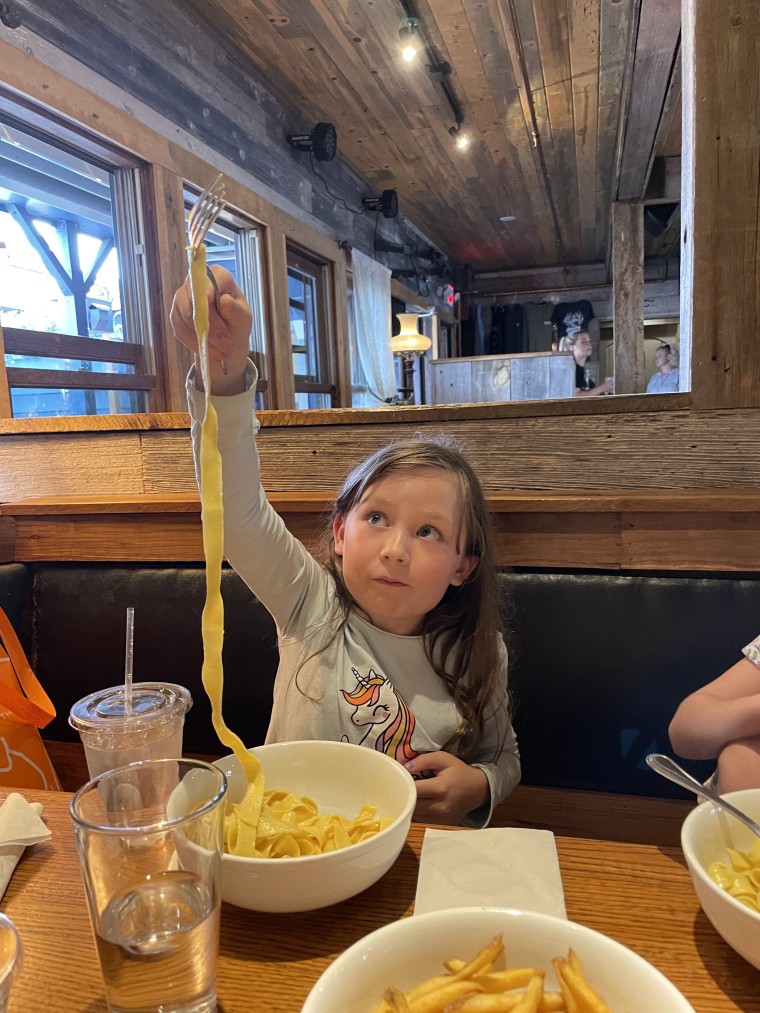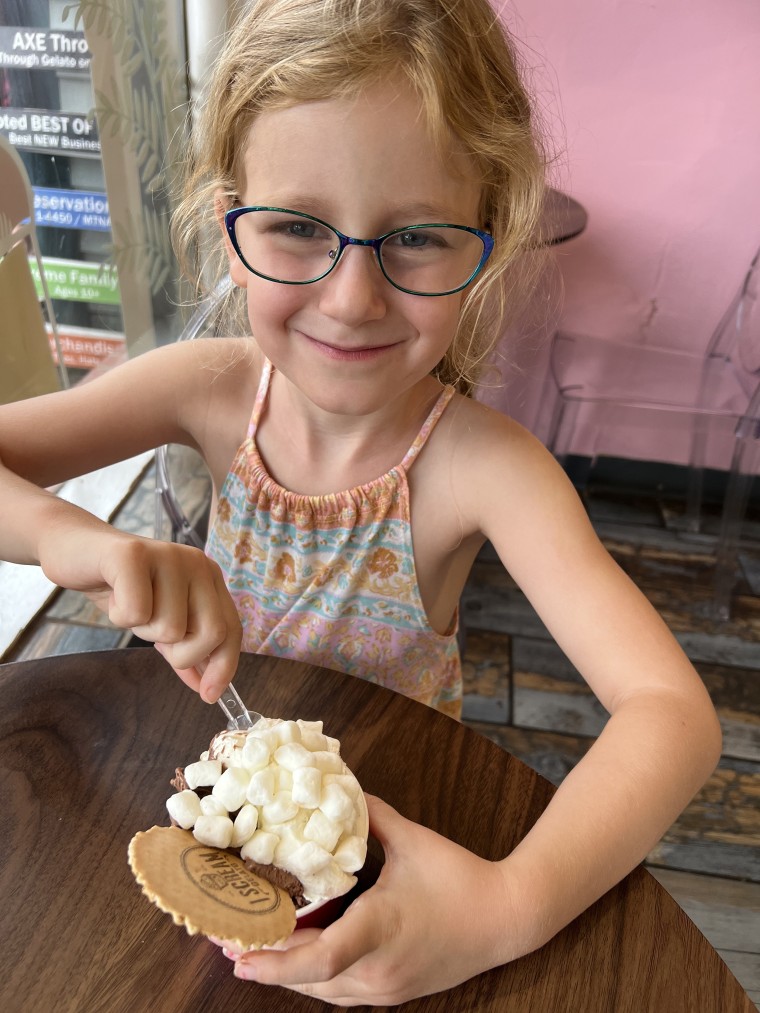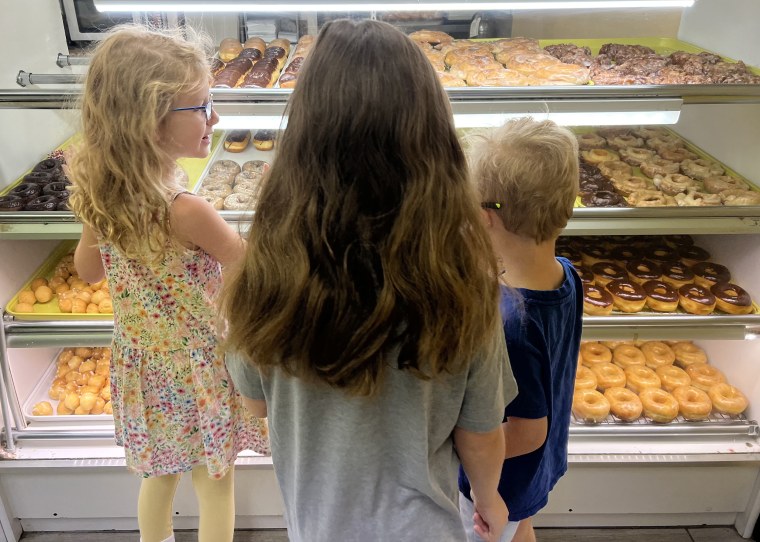Before going viral in a TikTok video in August, eating disorder coach Lindsay Ronga understood body image issues and the dangers of certain eating habits. After overcoming a life-threatening, seven-year struggle with an eating disorder “long before there was a road map for doing so,” she began helping other people do the same, she told TODAY.
For nearly eight years, the Harvard MBA and TEDx speaker — along with a team of other coaching professionals at the treatment center she founded, OutshiningED — Ronga has assisted hundreds of people in confronting and overcoming their eating disorders. Along the way, she's learned specific measures to help parents do their best to prevent eating disorders in the first place.
These measures are especially helpful to keep in mind during the holidays, Ronga said, as “the holidays often revolve around food," and parents and other adults often inadvertently make damaging or triggering comments about food.

Don't tell your child they're "overweight" or "obese" and avoid diets
The first thing Ronga recommends is to never put any child on a diet. “Restriction always leads to binge eating and harmful eating habits. ... Telling a child they can’t have something naturally makes them want it even more,” she told TODAY.
She said it’s common for children to be diagnosed by pediatricians as “overweight” or “obese,” but Ronga believes “those are harmful terms I’d never use to describe a child."

Instead, parents who've noticed harmful eating habits can and should provide a wide variety of health-conscious foods to choose from, and give their child some slack with unhealthier options, too.
It’s also a good idea to try to understand why a child seems continually drawn to less healthy options. “For most people, turning to certain foods isn’t about the food at all, but an underlying issue the food may alleviate in them temporarily,” Ronga said.
Don't talk about or buy food in the "extreme"
“The people who come to me with an eating disorder almost always tell me that, as a child, they either had unfettered access to unhealthy foods with no boundaries, or they never had access at all to any treats or candy around the home," Ronga remarked.
As a result, she discourages surrounding children with lots of unhealthy foods while also not restricting them from fun foods. Teaching children that nutritious foods are important for energy is equally important as teaching kids that it’s OK to enjoy fun foods, Ronga said.
With so many holiday traditions revolving around food — “From gingerbread houses to sugar cookies, we do it all at our house!" Ronga said — parents must be mindful of how they talk about food and how they impose limitations on sweets and candies, Ronga advised.
“With Halloween, one thing we’ve said in our home in the past is ... ‘I’m happy to let you decide how much candy to eat tonight. If I see you making good choices for yourself around this, I will not limit the pieces of candy. But if I think you need some help, I’m going to be there for you,’” she said.
Ronga believes speaking this way has helped her children learn what it feels like to make their own decisions about the foods they eat. When they have the freedom to decide, they’re more likely to listen to their bodies, she added.
Don't tell your kids they must "earn" their dessert
When kids have to earn their dessert by finishing everything on their plate or “taking those last two bites,” they learn to think of dessert as the goal, “and that gives food more power than it deserves,” Ronga said.
What’s more, kids who are told they have to clean their plates in order to receive dessert learn to distrust their own body signals, she added.
“If my child says they are full and I tell them they aren’t, I am showing them that I don’t trust them and that they can’t trust their own hunger cues,” Ronga explained.

At the same time, she said that dessert doesn't necessarily need to accompany every meal, and that in her home it’s something she offers regularly. “Anyone want a scoop of ice cream?” she might say to her kids after dinner.
Don't make comments about your child's body
That means never making negative comments about “gaining a few pounds” or “looking thicker somewhere,” as it can be "devastating for a child to hear and often triggers eating disorders,” she warned. But this advice also includes well-meaning compliments about a child’s body when that thing could and will likely change in time.
"You have beautiful legs," may seem innocent enough, but what you’re really telling your child is that you admire that part of their body, and it could be confusing to the child if and when that part of their body changes, she explained.
“It’s about making your child comfortable in their own skin, no matter what they look like, so they never second guess if Mom or Dad is any less proud once anything changes,” Ronga continued.
Conversely, she suggested that compliments like, “You sure are strong,” or, “You are so beautiful,” are great because they apply to each child no matter what stage of development they're in and will always be true from the perspective of a caring parent.
Don't talk about dieting or speak negatively about your body
Ronga suggested that parents never go on a diet themselves.
“This one is all about mirroring,” she said, adding that kids pick up on everything their parents do. If Mom is constantly complaining about how she looks in photos or that her pants are too tight or how she needs to lose a few pounds, “kids will invariably develop the same insecurities in themselves.”

Even if parents verbally discourage kids from imitating their behaviors, "kids regularly ignore our words and adopt our actions, so if dieting seems important to you, it will become important to them,” Ronga said.
She also advised parents to talk about their own body positively, no matter what it looks like, to be mindful of their own attitudes around food.
During the holidays especially, for instance, Ronga warned that adults have the tendency to make comments like, “I really shouldn’t go back for seconds,” or “I’m not even thinking about how many calories are in this piece of pie,” and that kids will usually adopt the same attitudes toward the foods they eat on these occasions.
What’s more, comments directed at children like, “Is that all you’re going to eat? It’s Thanksgiving, go get more!” or “Did you really have three servings of that?!” should also be avoided.
“Comments like these around the holidays can be problematic for many reasons,” she said. “If you have a child who is predisposed genetically to an eating disorder or already having some disordered thoughts, a comment from a family member can be quite activating.”
Ronga explained that it’s OK to say things like, “This food tastes good,” or, “Thank you for cooking this,” but “refrain from commenting on how healthy, unhealthy or caloric the food is.”
Whether it’s during the holidays or another time of year, Ronga said that kids need to develop a healthy relationship with food on their own, and that it’s usually outside influences, often within the home, that lead to unhealthy ideas or poor habits surrounding food.
“Food is such an important part of life,” she said. “We should all work hard to keep our interactions with it positive.”

